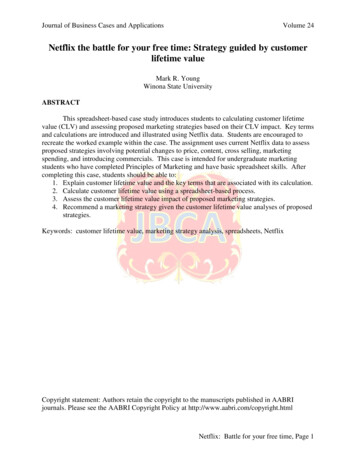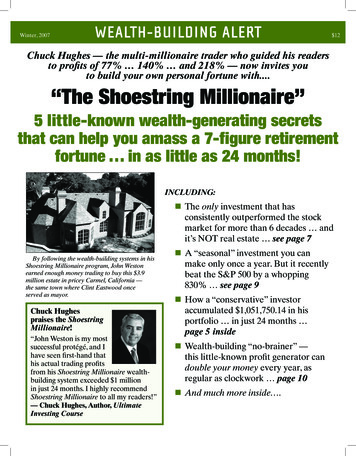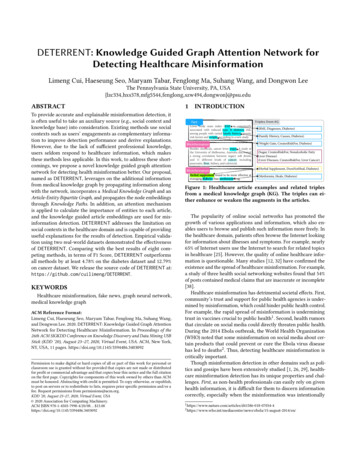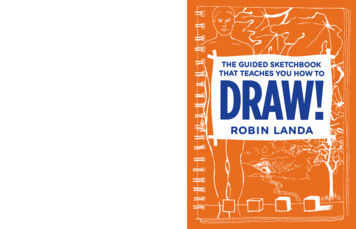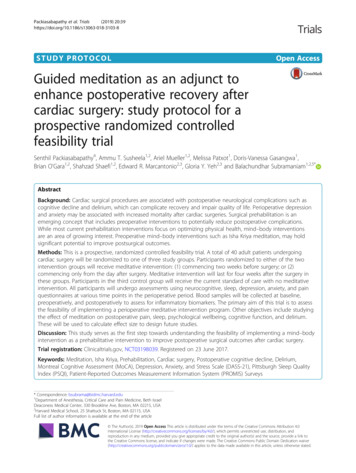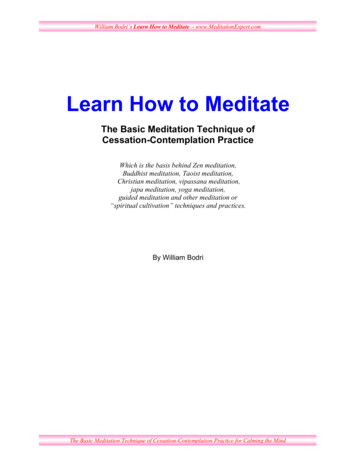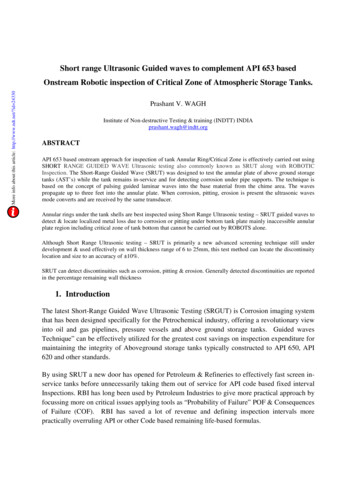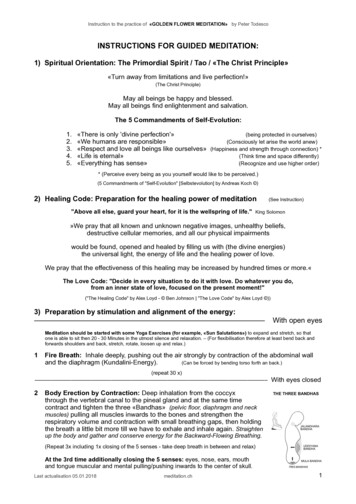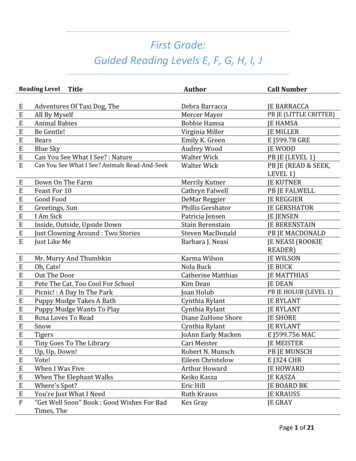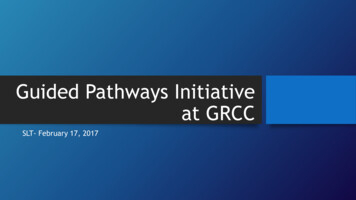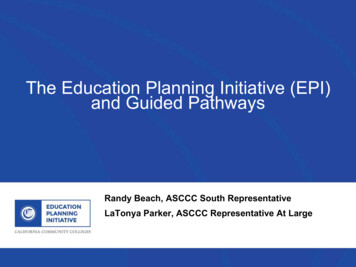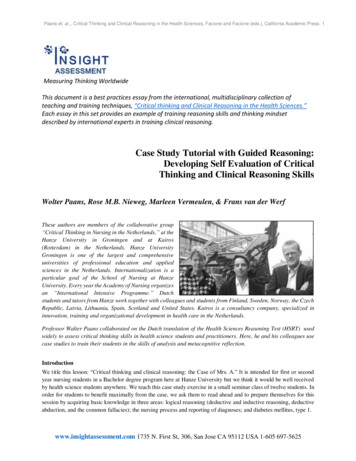
Transcription
Paans et. al.,, Critical Thinking and Clinical Reasoning in the Health Sciences, Facione and Facione (eds.), California Academic Press. 1Measuring Thinking WorldwideThis document is a best practices essay from the international, multidisciplinary collection ofteaching and training techniques, “Critical thinking and Clinical Reasoning in the Health Sciences.”Each essay in this set provides an example of training reasoning skills and thinking mindsetdescribed by international experts in training clinical reasoning.Case Study Tutorial with Guided Reasoning:Developing Self Evaluation of CriticalThinking and Clinical Reasoning SkillsWolter Paans, Rose M.B. Nieweg, Marleen Vermeulen, & Frans van der WerfThese authors are members of the collaborative group“Critical Thinking in Nursing in the Netherlands,” at theHanze University in Groningen and at Kairos(Rotterdam) in the Netherlands. Hanze UniversityGroningen is one of the largest and comprehensiveuniversities of professional education and appliedsciences in the Netherlands. Internationalization is aparticular goal of the School of Nursing at HanzeUniversity. Every year the Academy of Nursing organizesan “International Intensive Programme.” Dutchstudents and tutors from Hanze work together with colleagues and students from Finland, Sweden, Norway, the CzechRepublic, Latvia, Lithuania, Spain, Scotland and United States. Kairos is a consultancy company, specialized ininnovation, training and organizational development in health care in the Netherlands.Professor Walter Paans collaborated on the Dutch translation of the Health Sciences Reasoning Test (HSRT) usedwidely to assess critical thinking skills in health science students and practitioners. Here, he and his colleagues usecase studies to train their students in the skills of analysis and metacognitive reflection.IntroductionWe title this lesson: “Critical thinking and clinical reasoning: the Case of Mrs. A.” It is intended for first or secondyear nursing students in a Bachelor degree program here at Hanze University but we think it would be well receivedby health science students anywhere. We teach this case study exercise in a small seminar class of twelve students. Inorder for students to benefit maximally from the case, we ask them to read ahead and to prepare themselves for thissession by acquiring basic knowledge in three areas: logical reasoning (deductive and inductive reasoning, deductiveabduction, and the common fallacies); the nursing process and reporting of diagnoses; and diabetes mellitus, type 1.www.insightassessment.com 1735 N. First St, 306, San Jose CA 95112 USA 1-605 697-5625
Paans et. al.,, Critical Thinking and Clinical Reasoning in the Health Sciences, Facione and Facione (eds.), California Academic Press. 2The learning objectivesStudents completing this session will be able to: Analyze and interpret the clinical case Write accurate diagnoses Explain the thinking process underpinning the diagnoses being made Critically reflect on their personal diagnostic reasoning, analyzing and evaluating the quality of their reasoningskills Identify areas of personal development to improve diagnostic reasoningHow we teach this lessonThe case study supposes that a nurse conducts a patient assessment interview using Gordon’s framework (Gordon,1994). Gordon’s Functional Health Patterns Framework has eleven subject areas directing the collect of patient dataabout common patterns of behaviour that contribute to health, quality of life and the achievement of human potential.The framework is similar to others used in patient intake interviews to guide the clinician to conduct a comprehensiveassessment. We prepare copies in advance for each of the students of what appears to be a completed and transcribedinterview. In this case example, the interview has been conducted with a client named ‘Mrs. A.’ who has diabetesmellitus, type 1. Gordon’s eleven patterns can be found as the lay-out of a script of the interview.The interview is displayed over the next few pages as Figure 1: “Interview with Mrs. A.”Figure 1 “Interview with Mrs. A”1. Health perception/health managementCan you tell me how you are doing?- Reasonably well under the circumstances.Reasonably well under the circumstances?- Yes, I want to go home as soon as I can. There is plenty of work for me to do, and there’s no one tohelp me do it.Do you know why you were admitted?- Yes, apparently I fell asleep and the people at the workshop weren’t able to wake me. They know I ama diabetic, so they are quick to think it’s got something to do with that.Can you tell me what I can do for you?- Yes, you can ask if my new glasses have already arrived. I’ve got poor eyesight, you know. It’s goneworse in recent years.Is there anything else I can do for you?- No, I don’t think so. I’ll give the garage a call later on, to make sure that they take care of things.Do you ever feel down or depressed?- No, not really. Well, I’m on my own, you know. I live on the premises of the garage; there are plenty ofpeople I can talk to. But at night, you’re on your own again, aren’t you. And after a marriage of twentyyears, that’s not always easy. And then there’s the divorce. Most contacts are about work only.Are you in touch with your GP or with a diabetes nurse?- No, I take care of everything myself; I can cope. Although sometimes I’m a bit careless.What about your therapy management (compliance)?- Determining my blood sugar level, injecting the insulin, I do it myself; admittedly not always at thecorrect time. And I take blood samples, which isn’t something I enjoy. Sometimes I inject insulin withoutfirst determining the blood sugar level. I just inject the same amount as the days before.Does that go well?- More or less the same; I am less accurate because I don't consider it all that important. It’s always thesame anyway. If it doesn’t go well, I eat a bit more or inject a bit more insulin. I go by my feeling.2. Nutritional/metabolicHow about eating and drinking?- I eat and drink healthy, not too much, and not too little; I stick to my diet. The wife of one of myemployees cooks for me; I pay her for it. And I eat at the garage canteen. Not always in time, I admit. Iwww.insightassessment.com 1735 N. First St, 306, San Jose CA 95112 USA 1-605 697-5625
Paans et. al.,, Critical Thinking and Clinical Reasoning in the Health Sciences, Facione and Facione (eds.), California Academic Press. 3regulate it with the insulin. I don’t lose weight and I don’t put on weight. I just don’t take the time to eat.And when I do eat, I’m usually on my own Do you drink alcohol?- No, actually I never drink. Except for yesterday. I was sitting at the desk and I found a bottle ofblackcurrant gin. I used to drink it at the end of the afternoon. Just one glass before dinner. Yesterday Ithought: “I’ll have a couple”. So, I fell asleep. I’m not into drugs or anything like that. I don’t smokeeither.3. EliminationDo you have any problems with the bowels? Do you have to pass water often?- No problems; nothing special.4. Activity/exercise patternHow about your physical appearance?- I do everything myself; I don’t need any help. Sometimes when I feel listless and tired it takes me more timeto take care of things. I have the laundry done every two weeks. I don’t mind the odd spot or other. Nobody’sbothered anyway. Actually, I don't always see it.Do you perspire a lot?-No, I don’t think so.Do you practise a sport? How about regular physical exercise?- I always enjoyed diving in the Dutch Antilles. I don’t do it anymore. I can hardly see under water. I like toread. I can read reasonably well with extra reading glasses. I get plenty of exercise at work.5. Sleep/restDo you enjoy a good night’s sleep?- I sleep enough. Go to bed in time. I make sure that I have finished work at 7. Sometimes I feel tired andlistless in between. It annoys me. I’m also annoyed by small things. I'll be yawning by the end of the afternoon.How long have you been bothered by tiredness?- Since a couple of weeks6. Cognitive/perceptualWhat can you say about your eyesight?- Yes, can you ask if my new glasses have arrived? I don’t see well, you know. It’s grown worse in recentyears. I’m worried about my eyesight; I’m afraid that it'll get worse and I won't be able to see. And it alsoscared me that they couldn’t wake me. Suppose they hadn’t found me On the other hand, who cares?Do you have any small wounds, infections? And if yes, do they hurt?- A year ago, I had a superficial burn after an accident at work. It took a long time to heal. The skin was alsoinflamed for a while. It’s better now. I just didn't realise my left foot was so close to that gas flame. Anemployee quickly pulled me away. I have a few small wounds on my feet, they heal slowly; they feel a bitawkward.7. Self-perception/self-conceptHow did things used to be as far as your illness was concerned? / What about your medical history?- I’ve known about my diabetes since I was twelve. It sometimes bothered me when I couldn’t control it. Thingswere different in those days. Many visits to the GP, a long time in the waiting room and still not feeling well.And you weren’t allowed to eat the things you liked. Generally speaking, I can handle it better now, althoughlately I tend to neglect it sometimes. Although I’m aware of that. I’m never really ill and there’s nothing thatmakes me visit the doctor.How do you cope with your illness?- I more or less take care of everything myself. No problem. Perhaps sometimes I’m a bit careless.Are you properly informed about diabetes?- I believe I am; after all these years, you think you should know about it. You know what you are supposed todo, but you don’t always do it.8. Roles/relationshipCan they get along without you at work?- Sure, for a short time; I have good employees; things at the garage will run their course. It’s a familybusiness. Until recently, I used to run things with my husband. But now I am on my own. Sometimes things getbusy, because many financial things need to be done. And I like to lend a hand with the sorting work.You are on your own?www.insightassessment.com 1735 N. First St, 306, San Jose CA 95112 USA 1-605 697-5625
Paans et. al.,, Critical Thinking and Clinical Reasoning in the Health Sciences, Facione and Facione (eds.), California Academic Press. 4- Yes, I’m in a divorce procedure. My husband couldn’t stand working in the garage any longer and liked to livein the city. It’s a bit of a long-drawn procedure; but I’d prefer not to say much about it. But, well, alone is stillalone, and sometimes I think: ’why am I doing it?’Do you have any social contacts?- Plenty, every day; staff and customers. My son is in Aruba, I only see him about three times a year. Pity. Ireally miss him, especially at times like these. Apart from that, nobody actually. My staff see me as a goodboss, I think, although sometimes I can be rather curt and irritated. More so than in the past, though. It’s noteasy to get to know new people when you have to run your own business.Do you worry about the business?- No, economically things are reasonably stable. We have to work hard. Everyone is pulling their weight.9. Sexuality/reproductiveAre there any problems, sexually?- I miss my husband, from a relational point of view; sexually it’s less important. It was more important to myhusband. Our marriage had lost much of its excitement in that area; I didn’t really mind.10. Coping/stress toleranceDo you feel any stress?- No, I don’t feel any stress. Sometimes it’s very busy at work but that’s a pleasant activity. I can easily handlethe work. At least, if I have the energy.11. Value/beliefDo you have a special belief or religious conviction we should take account of?- No, I don’t.End of interviewPreconditionsFor this assignment you will need a study room for a period of three hours and a (student) colleague with whom you get along well.The room should have at least one large table or two small tables and two chairs. Have pen and paper at the ready. You will also behighly inclined to test your diagnostic reasoning in order to improve your nursing care skills.You should have a case, an assignments guide and an anamnesis interview conducted using Gordon’s framework. The interviewprovides the case data you will need for the assignments.MethodFirst read assignments 1 to 5, the case and the script before you start to answer the questions asked in the assignments. Assignment1 (1a to 1e) is carried out individually, without consulting your colleague (45 minutes). The remaining assignments (2 to 5) are carriedwith your colleague (45 minutes).This is followed by the plenary discussion afterwards (60 minutes).For the purpose of this assignment, imagine the following: your colleague has conducted an anamnesis interview with a patient.However, just before your colleague is about to write down the diagnoses, he is called away to resuscitate another patient. You cometo see the patient and discover your colleague’s notes. Use the notes that your colleague has written down (in this instance the casewith the script) to analyze the case. Since you do not want the patient to have to discuss his case history all over again, confineyourself to the information you have.The aim of the assignment is for you to use the knowledge you have to analyze the case with a colleague and determine theappropriate diagnoses. You will also analyze what your own diagnostic reasoning skills are and identify areas of personaldevelopment that may help you improve your diagnostic skills in your own clinical practice. The starting point is to combine logicalreasoning with background information on how to make diagnoses.Figure 2: Instructions for this case study lessonIn this small seminar session, we begin the lesson by explaining that this is a four part exercise that will be completedover several hours. The lesson involves the analysis of a case history that will be partly dealt with individually andwww.insightassessm
Gordon’s Functional Health Patterns Framework has eleven subject areas directing the collect of patient data about common patterns of behaviour that contribute to health, quality of life and the achievement of human potential. The framework is similar to others used in patient intake interviews to guide the clinician to conduct a comprehensive assessment. We prepare copies in advance for .
